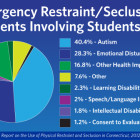Fines & Sanctions
Blood Collection Company Fined $25,000
|
A New Jersey-based company that operated four blood collection facilities in Connecticut without the proper approvals has been fined $25,000 by state health officials. Accu Reference Medical Lab has acknowledged it ran the blood collection sites without obtaining a necessary written certificate of approval from the state, according to a consent order released by the state Department of Public Health. Operating the centers prior to that regulatory approval violates state law. The facilities, which in some cases operated illegally for nearly a year, have been shut down since DPH issued an interim cease and desist order to the company in October. Konstantin Bas, the licensee for Accu Reference, signed the DPH consent order, agreeing to its contents.
